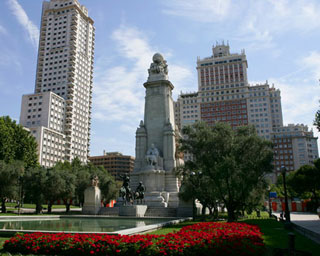
Sunny Spain, a European neighbour of the United Kingdom, has over the years cemented itself as one of the prime destinations for expats both wanting to work or wanting to relax. There is a strong network of British expatriate workers and retirees over the breadth of Spain, and if you are seeking a new destination that isn’t too far from home, Spain could certainly be the ideal place.
Spain is country with lots of history, and offers wonderful contrast between old style ideals and modern living. Residents of Spain are afforded a good standard of living, and British expats are welcomed by the friendly, sociable nature of its native citizens.
The cities of Spain are known to be vibrant and exciting. With a rich culture steeped in architecture, food, fashion and entertainment, Spain has much to offer to the foreign expat.
Employment, Work Permits and Visas
In recent years Spain has encountered a few problems with its economy, so if you are travelling with the intention to work it is advised you gain employment first as opposed to searching when you get there. As a British citizen you will not need a visa to enter the country, simply your passport. If you are not an EU citizen then you will have to apply for a working visa through your local Spanish embassy. If you need a visa you will need a selection of documents to go along with your application, including a valid passport, the application form and a sponsorship letter from your new employer.
Even if you are an EU resident, upon entering Spain you should apply for residency status, as this will give you all the rights of Spanish citizens. With a residency permit you will be able to bypass certain elements of red tape when it comes to matters such as transferring money in and out of the country , or applying for a Spanish drivers license. To apply for residency status you should visit your local police station when you arrive in Spain.
Expat job prospects in Spain are not currently as good as in other countries, due to the economic downturn, however that doesn’t mean it is impossible to find work. Finding work before you travel is the best situation and speaking Spanish will greatly improve your chances. Expats are generally welcomed in Spain, in fact there is a special rate of tax which allows for foreign workers to opt for a flat-rate tax of 24 percent on all their Spanish income, albeit with a few conditions attached- there is a maximum validity period of five years and a maximum earnings figure of 600,000 euros per year. The 24 percent flat rate is different to native Spanish citizens, they are taxed on a rising scale between 15 and 43 percent based on their earnings. To qualify for the special expatriate tax scheme you must register for it within six months of your arrival to work in Spain, if you fail to do so you will be seen as a traditional Spanish tax resident and pay tax on their rising scale. Although you may find that wages in Spain are a little less than in some other places, the quality of living is generally high and the cost of living is fairly low.
In the current climate the best sectors in which to find work are the construction and tourism industries.
Business Culture
Spain has a formal approach to business similar to most Western countries. Smart attire is a necessity for business, and punctuality must always be good. When addressing people you must refer to them as Señor or Señorita, for men and women respectively, and when meeting it is customary to greet each other with a simple handshake. Business cards are handed out frequently and should generally be printed in both Spanish and English. Work hours tend to be 8am to 5pm, however a long lunch break is not uncommon. Despite English speakers being very common, Spanish is the primary business language so again, mastering it is invaluable.
Accommodation

In the main cities like Barcelona and Madrid there are a number of good housing options for foreigners and expats. It is very easy to find good short term apartments, and long term apartments are just as easy to source, however for this you may find it helpful to enlist the services of an estate agent. Prices for an apartment average around €700 to €850 per month.
If you are looking for a larger home you will be looking at paying around €1,500 to €3,000 per month, varying due to location and size. You may have to pay a number of months' rent in advance.
 Transport
Transport
Public transport is very good in Spain, the cities all have good networks of trains and buses, running till around midnight. If you wish to drive a car and have a valid EU license then all you have to do to be able to drive is get a special stamp form any driving authority office. If you do not have an EU license you will have to join a driving school, pass a medical exam, written exam, and a driving test.
Healthcare
Healthcare in Spain is of a high standard, and that counts for both private and public. If you are employed with a large company you may find that you are given private health insurance, in which case you will be lucky to have private healthcare should you become unwell. Throughout Spain there are many private hospitals and they will all have English speaking staff and top class facilities.
Even if you are not given healthcare through your employer you can still take out private health insurance for a cost of around €50.
However don't think that the public system is lacking, public funds have ensured that the Spanish healthcare standards are exceptionally high. To use the public system you will have to first gain a social security card, and then a medical card from any local clinic.
 Education
Education
If you are moving with children and you wish to place them in a Spanish school then you will have a number of options including public, private, and semi private. You will also be able to choose between mixed or single-sex schools. You will also be able to choose the language your child is taught in, as there are English and international schools.
Public schooling in Spain is of a high standard but most expats, who earn enough money, tend to go for private schooling. In public schooling you are likely to be taught in Spanish.
Semi private schools are half paid for by the government, leaving you to pay around €100 to €200 per month. The quality of these schools differs from area to area, in the more affluent areas the quality will be greater.
Private schools are probably the best option but competition for places is fierce. Private school costs vary between €250 to €1000 per month depending on the school. Some of these private schools are international schools that will offer international curriculum such as British ones.
Admission for schools occurs during the month of March, you will be required to visit the school you have chosen and present ID for your child and your own registration card. You will then be notified about which school they will be accepted into. This scheme only applies to public and semi-private, private schools have their own admission procedures.
 Entertainment and lifestyle
Entertainment and lifestyle

The way Spaniards live and conduct themselves is not greatly different to that of the UK, and there won't be the strong cultural differences you find in some other locations.
In terms of sights, sounds, attractions and entertainment Spain is a fantastic country to live in. The main cities are populated with a number of museums, restaurants and cafés, all with vibrant night-life as well.
Spaniards are fond of sport, and of course it would be an injustice to not visit two of the most majestic stadiums known to man- FC Barcelona's Camp Nou and the Bernabeu which is home to Real Madrid.
Everyone is familiar with some aspects of Spanish culture, and the country has a wonderful and colourful environment that is very hard to not fall in love with. There are many fine restaurants where you can sample tapas, the Spanish favourite, and if you're lucky (and determined) you might be able to bag a table at El Bulli one of the world's greatest restaurants located in Catalonia.
If you are looking for a destination that offers a different environment to the UK, while at the same time not being too far away, then Spain could be the ideal location for you.
 Language
Language
Spain has a particularly diverse set of native languages. Besides Castilian (that’s Spanish to you and me), there are populations of Basque, Catalan and Galician speakers across the country.
The language that’s going to get you through the day, however, is Castilian, and it’s of utmost importance that you have at least a basic grasp of the language before you make your move. Unlike other Northern European countries, English is not as commonly spoken, so be prepared for a lot of confused faces if you try and manoeuvre through a conversation by speaking English.
Although it may be intimidating at first, WhichOffshore has trawled the Internet and compiled lists of what we judge to be the top-notch language resources available to cater both to your written translation needs and language learning experience.
Top Translation Services
When it comes to documentation, using a professional service is a must. With thousands of options out there it’s important to select the right one. What makes a good translation agency? First of all it should be certified: that means that their processes have been tested and are regularly checked. Also, their translators should be native speakers, and experience is often a good indicator of quality.
To get you started, WhichOffshore has compiled a list of our favourite translation agencies of the moment.
Here are a couple of the best (in alphabetical order):
| ABC Translink | abctranslink.com | +34 977 803 522 |
| Agestrad | agestrad.com | +34 958 289 928 |
| Asiatis | asiatis.es | +34 93 584 6577 |
| Kwintessential | kwintessential.co.uk | +44 (0)1460 279900 |
| Robertson Languages International | robertsonlanguages.co.uk | +44 (0)118 934 6000 |
| Traductores espanoles | traductores-espanoles.com | +34 911 861 170 |
| Tradupolis | tradupolis.es | +34 91 400 9135 |
| TranslateMedia | translatemedia.com | +44 (0)20 8834 4840 |
Methodology
We have reviewed companies based on the quality of a test translation provided, customer service, the information provided on their website, ease of contact, helpfulness of the staff and final time to respond to customers.
Top Resources to Learn Spanish Online
Learning a new language is a long process: being persistent is obviously key but so is having fun along the way. Therefore, a good language learning programme needs to be enjoyable, full of resources, accurate, engaging and well presented. Although we recommend enrolling in a face-to-face program once in the new country for the best results, the net offers multiple resources to help you in your Spanish-mastering journey.
We have provided a selection for you.
Blogs and websites
Here is our list of the best (in alphabetical order):
| Radio Lingua | radiolingua.com |
| Spanish Bites | spanish-bites.com |
| Spanish Learning Corner | spanish-learning-corner.com |
| Spanish Obsessed | spanishobsessed.com |
| The Spanish Blog | thespanishblog.com |
Methodology
We have reviewed blogs based on the information provided on their website, on quality of free content, online customer reviews, on the user experience, on engagement.
YouTube Channels
Here is our list of the best (in alphabetical order):
| Butterfly Spanish | youtube.com/user/ButterflySpanishola/videos |
|---|---|
| Learning Spanish | youtube.com/user/LearningSpanishTube/videos |
| Spanish Dict | youtube.com/user/SpanishDict/videos |
| Spanish Pod | youtube.com/user/spanishpod101/videos |
| The Spanish Blog | youtube.com/user/thespanishblog |
Methodology
We have reviewed the channels based on the information provided in their videos, quality of presentation, teaching methodology.


